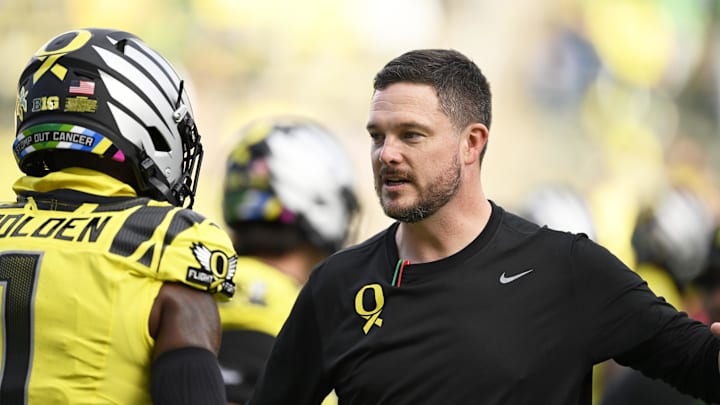Why Coaching Matters More in 12-Team College Football Playoff Era

I am a rare American who could have died contentedly, after a long life, without ever seeing a College Football Playoff. But even I want to see a better format than the one we get this month. Somehow, the sport has leaned hard into the two worst aspects of the NFL postseason: overseeding division/conference champions and games at neutral sites.
That mistake has been heavily discussed, and it’s fixable. But this month, we will see another similarity between the college postseason and the pros:
Coaching will matter more than ever before.
By coaching, I don’t mean the old-school kind that fueled college-football legends: Junction Boys, Those Who Stay Will Be Champions, etc. I mean actual X’s and O’s coaching: Strategizing to take advantage of specific matchups, adjusting based on the opponent’s personnel and tendencies, in-game decision-making.
Talent is becoming more evenly distributed, like in the NFL. Teams must beat a minimum of three postseason opponents to win a championship, like in the NFL. The cumulative effect will mean a lot of close games that require agile coaching minds, like in the NFL.
In four of the New England Patriots’ six Super Bowl–winning seasons, they trailed in a playoff game in the fourth quarter. In another of the Patriots’ title years, two of their three playoff games were tied with fewer than five minutes left.
Bill Belichick was a master at finding the tiniest advantage and exploiting it, or making exactly the right radical change from one week to the next. College coaches cannot mix things up as much as NFL coaches; their players can only handle so much.
But if you watch a lot of college football, you can probably think of some coaches who win a lot of games even though you suspect they aren’t all that great at—how do I put this?—coaching football.
They recruit well. They manage people. Players love them. That’s enough to beat a lot of teams. It’s probably not enough to beat three of the top 15 teams in the country in consecutive weeks. Some will get exposed. One or two might prove the skeptics wrong.
There will probably not be any Ed Orgerons accumulating a preposterous amount of talent and riding it to a national title. We might never see a team as loaded as the 2019 LSU Tigers again.
But there will also be no Nick Sabans accumulating a preposterous amount of talent and riding it to seven national titles.
Saban would thrive in any era, of course. But the environment for most of the last two decades was distinctly suited for the way he thrived with the Alabama Crimson Tide. Unlike in the 1980s, his teams could generally survive one regular-season loss. Unlike teams this year, Saban had to win only one or two playoff games to win a title.
During one 14-season stretch with the Florida State Seminoles, Bobby Bowden won 88% of his games and two national titles. During a 14-season stretch at Alabama, Saban won 90% of his games and six national titles.
For most of Saban’s reign, the four-team playoff and lack of NIL deals created an environment where the rich replenished: Recruits wanted to play in the playoff, Alabama had the best chance of making it and the main reason players transferred was that they weren’t going to play. It wouldn’t be fair to Saban to say the Crimson Tide’s success was self-perpetuating. But the conditions were right for the best coach in the sport to perpetuate his success, and so the best coach did.
Yes, Belichick won six championships in New England—the same number Saban won at Alabama. But Belichick did it in an 18-year stretch with the best quarterback in the history of the game. College programs obviously will not have that kind of stability at the game’s most important position.
We have already seen hints of what is to come.
From 2015 to ’22, 18 of 24 College Football Playoff games were decided by double digits. In the summer of ’21, NIL deals became legal, and the NCAA officially made all transfers eligible to play immediately at their new school. The effects of those changes started to take hold, and in ’23 and ’24, four of the six CFP games came down to the final minute.
You can expect more of that. It will make for a wildly entertaining product, like the NFL. But it will put a spotlight on coaches’ decisions, like in the NFL. (It will, unfortunately, also mean a lot of games are decided by dubious refereeing, like in the NFL.)
One of the most memorable and consequential plays of this entire college season was one that didn’t count. With 10 seconds left, clinging to a one-point lead over the Ohio State Buckeyes, Oregon Ducks coach Dan Lanning intentionally sent 12 defenders onto the field. Lanning correctly calculated that an illegal substitution penalty was a small price to pay for running a few seconds off the clock with an extra defender.
The NCAA changed the rule the next week. But Lanning’s canniness bodes well for Oregon, and not just this season. Lanning said after the Ohio State game that he runs through all sorts of rare game situations with his staff, looking for unconventional tactics that can make a difference in a close game. That is what the best coaches do. This month, we’ll find out who the best coaches are.
More College Football on Sports Illustrated
feed
